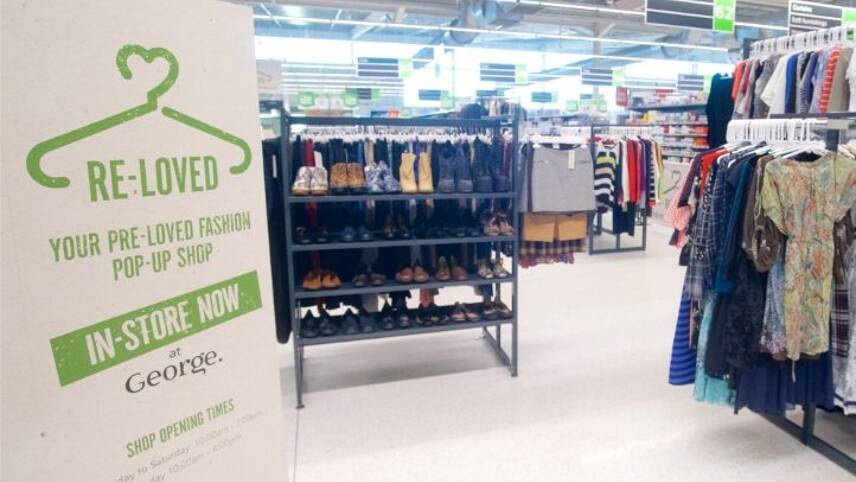Register for free and continue reading
Join our growing army of changemakers and get unlimited access to our premium content

The pop-up will open daily until September 30. Image: Asda
The supermarket chain yesterday (2 September) launched a pop-up shop within its Milton Keynes store, featuring donated second-hand clothing for men, women and children.
Called ‘Re-Loved’, the pop-up will remain open for four weeks. During this time, Asda will conduct customer research to find out what would best encourage consumers to reuse, repurpose or recycle their unwanted clothes.
All funds raised through the pop-up will be donated to Asda’s charitable Tickled Pink campaign, which supports Breast Cancer Now and Breast Cancer Care.
“By trialling our Re-Loved pop-up shop, we hope to help create another route for unwanted clothes to find a new home and encourage people to think again about throwing away that top or those jeans they no longer love,” Asda’s senior director for sustainable fashion sourcing Melanie Wilson said.
State of play
Asda is notably the UK’s second-largest fashion retailer by volume in the UK, with only Primark ahead of its George brand in this respect. In a drive to use this scale for good, Asda has pledged to source only recycled or sustainably certified polyester, cotton and viscose across George by 2025.
George at Asda has also implemented a zero-tolerance policy to the incineration of clothing and textile waste, with all surplus or faulty items sent instead for recycling or reuse by charities. In a bid to minimise customer fashion waste, it also hosts recycling stations at almost 500 stores, where donated items are sorted and sent for either reuse, recycling or downcycling into products such as rags or filler.
Nonetheless, it has, to date, been reliant on a ‘fast fashion’ business model, in which clothing is sold cheaply at scale. The launch of the Re-Loved pop-up shop marks its first trial of an alternative business model, centred around circular economy principles.
Secondhand September
In related news, Oxfam this week kicked off a month-long international campaign aimed at changing the general public’s fashion shopping habits in a way that will minimise waste.
Under the tagline #SecondhandSeptember, the charity is encouraging people to avoid buying any new fashion items until at least October 1, instead shopping second hand, swapping with others and wearing what they already own.
Today’s the day! Are you wearing your #upcycled shirt? Your #SecondHand shoes? Celebrate the start of #SecondHandSeptember with us by RT this film & find out why we are saying no to new clothes to protect the planet & beat poverty! 👉 https://t.co/7euTme7kjG pic.twitter.com/NRLrUfjokL
— Oxfam (@oxfamgb) September 1, 2019
The campaign comes at a time when £140m worth of clothing is landfilled annually in the UK, according to WRAP. On a global level, the Ellen MacArthur Foundation estimates that $460bn is currently lost due to the underutilisation of clothes, as well as $100bn from clothing that could be used but is landfilled or burned.
In a drive to address this issue, many big-name fashion firms have begun to offer resale, rental, repair or customisation options. H&M, for example, recently launched garment repair and customisation facilities across its stores in France, Germany and Norway, while VF Corporation now sells upcycled goods through its ‘The North Face renewed’ platform and Urban Outfitters offers US customers rental boxes. In the luxury fashion sub-sector, the likes of Burberry and Stella McCartney have been providing repair services and aftercare advice for years.
Moreover, several big-name retailers and brands are beginning to struggle amid rising consumer demands for more sustainable fashion, amid a backdrop of climate strikes and net-zero legislation. Forever 21 this week began preparing for a bankruptcy filing, following the likes of Sears, Principles, Jane Norman, BHS and Austin Reed.
However, experts have repeatedly warned that progress to date has not been rapid enough for the fashion industry to comply with global climate targets, as well as planetary resource boundaries. Of the 213 circular economy targets for 2020 set by 90 big-name fashion companies taking part in Global Fashion Agenda’s collaborative circular economy campaign, for example, just one-fifth (21%) have been met.
Sarah George


Please login or Register to leave a comment.